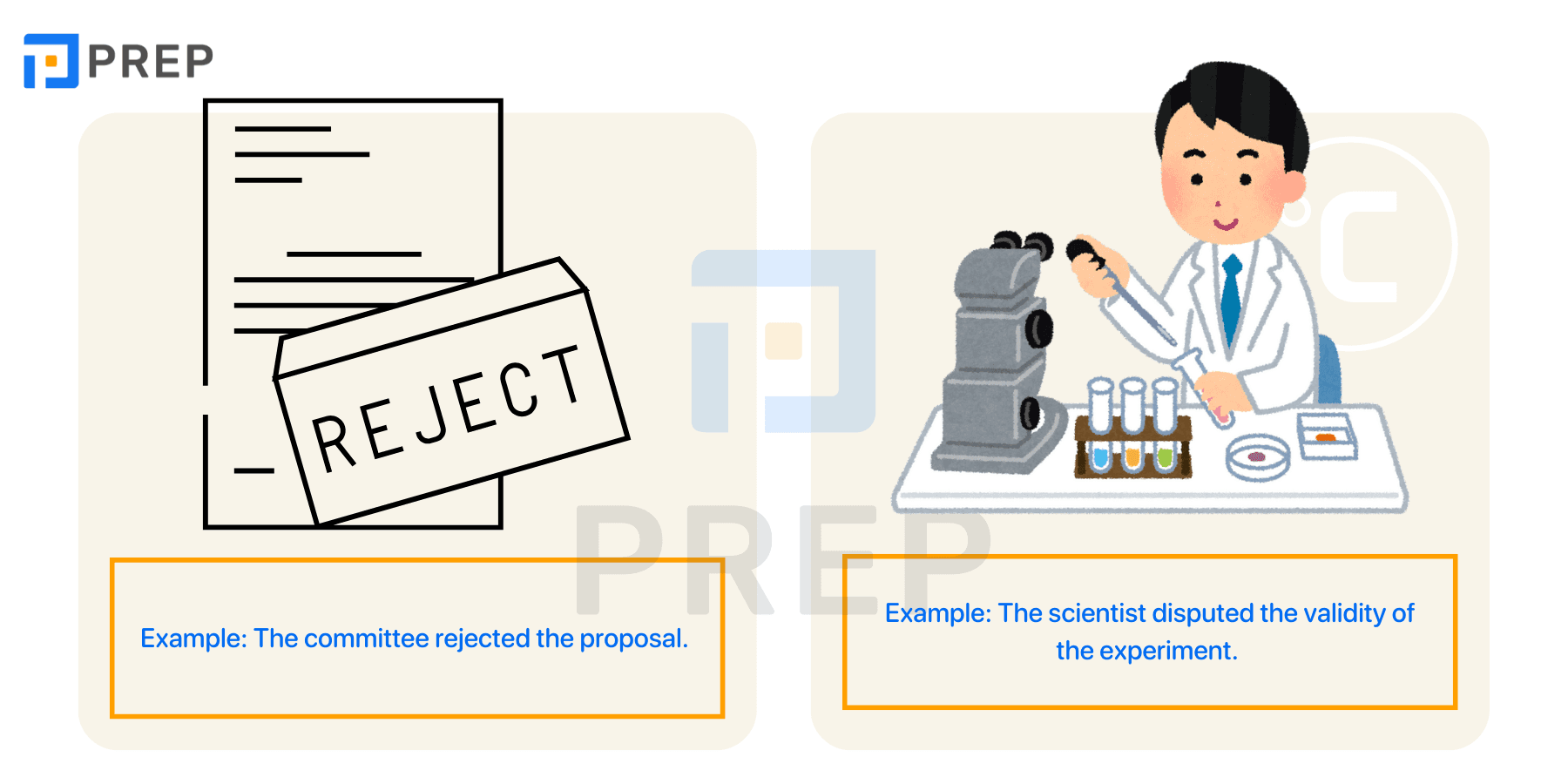Deny in English: Complete Usage Guide, Grammar Rules & Examples
The verb Deny in English stands as one of the most sophisticated tools for expressing contradiction and refusal. From courtroom dramas to everyday conversations, this powerful word shapes how we communicate disagreement, reject accusations, and establish boundaries. Understanding its intricate usage patterns separates advanced speakers from intermediate learners.

I. Definition of Deny in English
Deny, pronounced /dɪˈnaɪ/, operates as a transitive verb with remarkable semantic flexibility. Etymology traces this word to Latin "denegare," meaning "to refuse utterly." Modern English employs three primary meanings: to say that something is not true; to not allow someone to have or do something; to not admit that you have knowledge, responsibility, feelings, etc.
For example:
-
Peter denies that he broke the window.
-
The president has consistently denied the rumors.

II. Words/phrases used with Deny in English
Professional English demands mastery of sophisticated "deny" constructions. These patterns appear frequently in academic writing, legal documents, and formal communications:
|
Words/phrases |
Example |
|
It can’t be denied that + S + V |
It can’t be denied that TV does influence attitudes and beliefs. |
|
There’s no denying the fact that + S + V |
There is no denying the fact that good feedback can significantly improve learning processes and outcomes. |
|
Deny (oneself) |
I’m denying myself desserts right now, while I’m on this diet. |
Note: The reflexive construction "deny oneself" carries philosophical implications about self-control and sacrifice, distinguishing it from simple refusal.
III. Deny synonyms in English
Vocabulary sophistication requires understanding subtle distinctions between related terms. Each synonym carries unique connotations and usage restrictions:
|
Deny synonyms in English |
Meaning |
Example |
|
Refuse /rɪˈfjuz/ |
to say that you will not do or accept something |
Anna refused to answer the question. |
|
Reject rɪˈdʒɛkt/ |
to refuse to accept, use, or believe something or someone |
The committee rejected the proposal. |
|
Decline /dɪˈklaɪn/ |
to refuse |
Jack declined the invitation to the party. |
|
Dispute /dɪˈspjut/ |
to disagree with something that someone says |
The scientist disputed the validity of the experiment. |
|
Rebut /rɪˈbʌt/ |
to argue that a statement or claim is not true |
The lawyer rebutted the accusations with strong evidence. |
|
Repudiate /rɪˈpjudiˌeɪt/ |
to refuse to accept something or someone as true, good, or reasonable |
The official repudiated the claims of corruption. |
|
Disavow /ˌdɪsəˈvaʊ/ |
to say that you know nothing about something, or that you have no responsibility for or connection with something |
The politician disavowed any involvement in the scandal. |
|
Negate /nɪˈɡeɪt/ |
to show something to be wrong or to be the opposite of what was thought, or to cause something to have no effect |
The new evidence negates the previous theory. |

IV. How to Use Deny in English
Sophisticated English communication requires understanding "deny" across multiple grammatical environments and discourse functions.
1. Position of Deny in a Sentence
Deny demonstrates regular conjugation patterns while maintaining semantic consistency across temporal contexts:
1.1. Acting as the main verb in a sentence and conjugated according to tense
For example:
-
She denied her adultery.
-
I denied all the rumours they said about me.
1.2. Serving as the subject in the form of to-V or V-ing
For example:
-
To deny his part in the scandal is just a blatant lie.
-
Her denying her wrongdoings showed what kind of person she was.
2. Deny in Sentences
Advanced speakers employ "deny" in sophisticated grammatical constructions that demonstrate linguistic maturity:
|
Deny in Sentences |
Example |
|
Deny + something |
He denied everyone’s efforts. |
|
Deny + Ving |
I deny playing with the kids at noon. |
|
Deny + That + clause |
Richard denied that he eats a lot of candies. |
|
Deny somebody something |
The manager has denied Jack the opportunities to get promoted. |
V. Distinguishing Deny and Refuse
Understanding precise differences between "deny" and similar verbs enhances communication effectiveness and prevents semantic confusion:
|
Deny |
Refuse |
|
|
Usage |
|
|
|
Structure |
Deny + Ving |
Refuse + to V |
|
Example |
Neil denies breaking the window. |
Neil refuses to join the party. |

VI. Common Errors when using Deny
Even advanced speakers make subtle mistakes with "Deny." Recognizing these patterns prevents communication breakdowns:
1. Incorrect complement selection
❌ The company denied to participate in unethical practices.
✅ The company denied participating in unethical practices.
2. Inappropriate tense sequencing
❌ She denied that she will be there yesterday.
✅ She denied that she was there yesterday.
3. Double negative constructions
❌ He didn't deny not knowing about the incident.
✅ He didn't deny knowing about the incident.
VII. Exercises with Deny in English
These exercises simulate real-world scenarios where "deny" appears in professional and academic contexts.
1. Exercise
Exercise 1: Conjugate the verb correctly with Deny
-
Maria denied…………(walk)…….. on the grass.
-
Emi denied………(not do)……….. the homework.
-
Neil denied………(talk)……….. disrespectfully to the elders.
-
Xavia denied………(cheat)……….. in the exam.
-
Sarah denied that her father………(be)……….. a thief.
-
Nick denied that he ………(have)……….. a girlfriend.
-
Jackson denied that it………(be)……….. her who made that stupid mistake.
-
Jimmy denied………(play)……….. video games during class.
-
Alex denies … (break) the window.
-
He denied …. (know) about the plan.
Exercise 2: Rewrite the sentence using Deny without changing its meaning
-
It’s hard to refute these biblical arguments.
➡ ………………………………………………………………………………………
-
Walsh didn’t confirm that the money had been paid.
➡ …………………………………………………………………………………….
-
Even now, he refuses to admit the complete truth.
➡ ………………………………………………………………………………….
-
He said he didn’t steal the money.
➡ ………………………………………………………………………………………
-
She claimed she wasn’t involved in the accident.
➡ ………………………………………………………………………………………
2. Answer
|
Exercise 1 |
Exercise 2 |
|
|
Mastering Deny in English transcends simple vocabulary acquisition—it represents sophisticated command of English communication dynamics. This verb's power lies in its ability to navigate truth claims, social relationships, and professional obligations with precision.
Advanced speakers recognize that "Deny" carries implications beyond surface meaning. Every denial statement potentially affects credibility, relationships, and future opportunities. Professional success often depends on choosing exactly the right form of denial for specific contexts.

Hi I'm Chloe, and I am currently serving as an Product Content Administrator at Prep Education. With over five years of experience in independent online IELTS study and exam preparation, I am confident in my ability to support learners in achieving their highest possible scores.
Comment
Premium content
View allPersonalized roadmap
Most read












